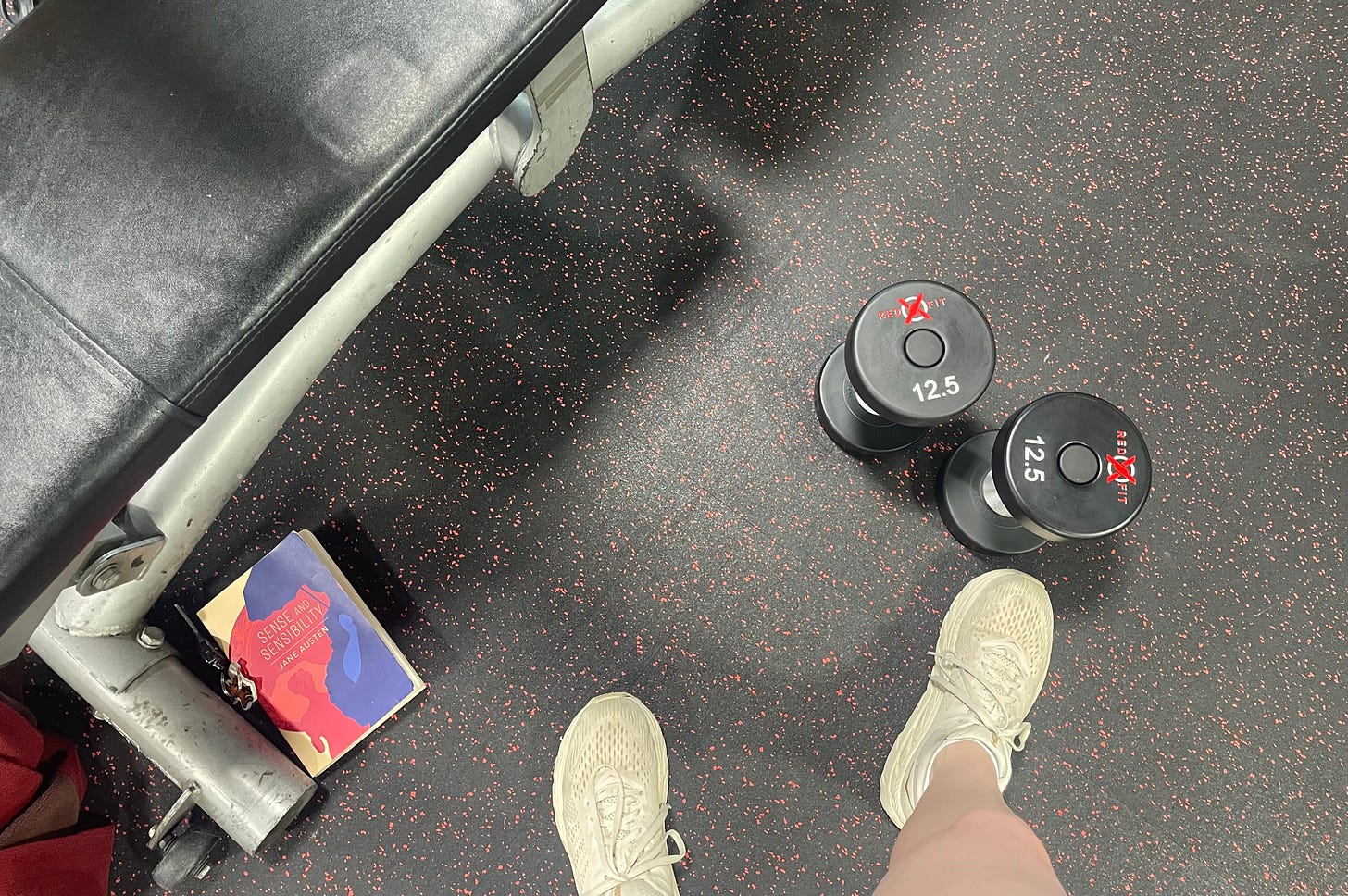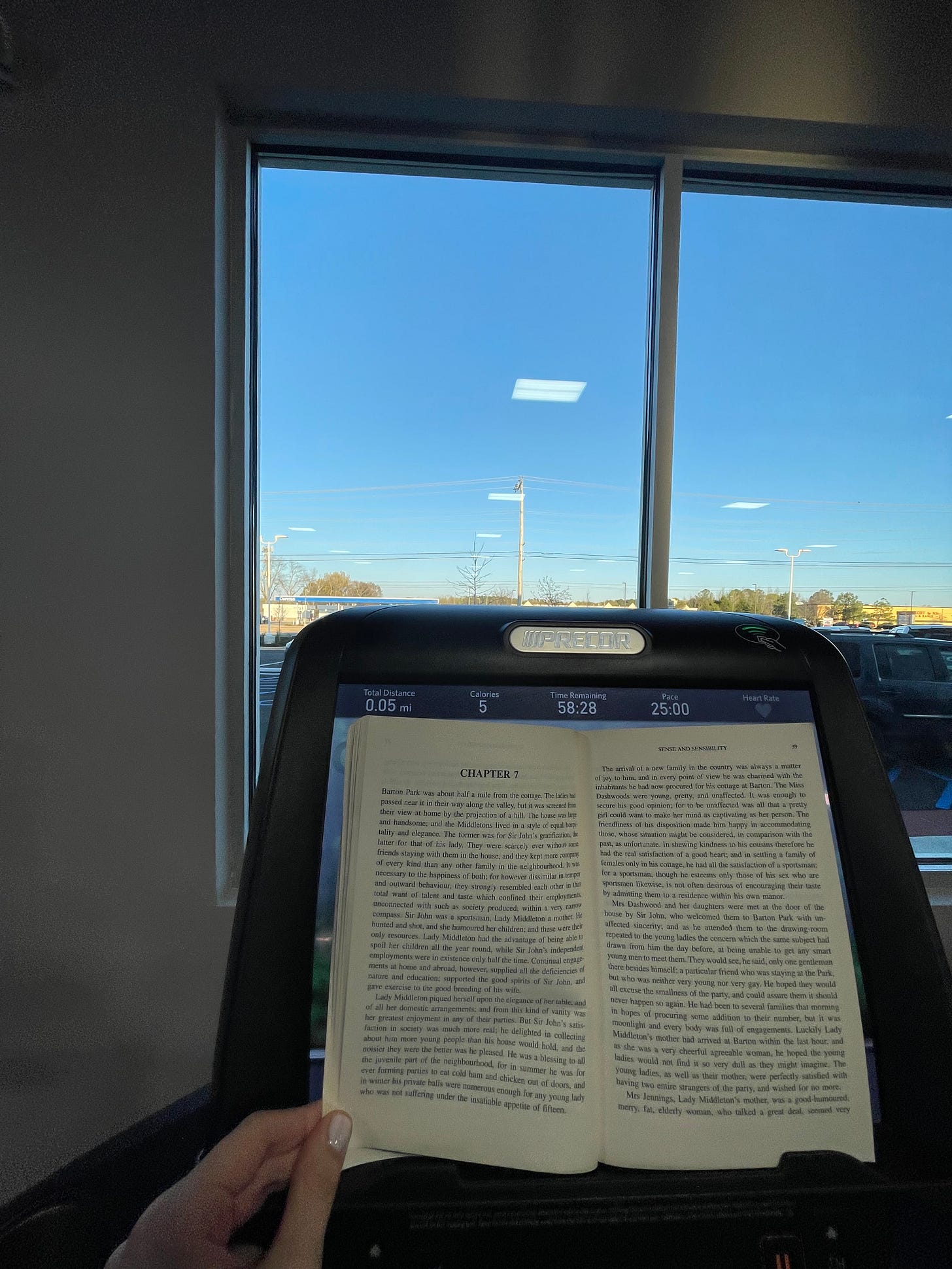Keep reading for:
The overlaps in my approach to fitness and faith
The 4.5-minute video that changed the way I view the Bible, + a bonus rec
I find a great comfort in rituals.
Definitions are important here. Let me explain: While a routine implies something completed regularly out of a sense of duty, a ritual carries a connotation of fulfillment, or even a higher purpose.
Online gurus have said that the difference between a ritual and a routine is the attitude behind it. While I’m typically hesitant to take a guru’s word for anything, I find there to be a nugget of truth here. Completing my nighttime skincare regimen is a ritual at 10 p.m., but a routine once I’ve fallen asleep on the couch at 11:30, contacts fused to my eyeballs. Preparing myself a filling and healthy breakfast is a ritual on a Saturday morning, but a routine when it’s 7:28 a.m. and I need to be out the door by 7:30. (Now I’m in danger of digressing into an unwelcome illustration of my time management struggles…but you understand my point, right?)
I crave variety and am not a huge fan of routines. But a ritual? That, I can get behind.
One ritual that has more or less been a constant for me since college is that of exercise. Though I wasn’t blessed with a great measure of athletic talent, I have found a predictable joy in regular training. I’m not a competitor—my entire goal with exercise is to do what it takes to keep my body healthy, and there are certainly elements of the process that I approach more begrudgingly than others.
One of the primary principles of exercise is adaptation. The human body is unbelievably adaptable, able to optimize itself for all manner of tasks with proper training.
Adaptation isn’t a passive process. I wasn’t able to squat 135 pounds or run a mile the first time I tried, but rather, I built up to these accomplishments through a process that folks in the fitness world call progressive overload. The idea is that, by incrementally increasing the difficulty of an exercise from one training session to the next, you’ll encourage your muscles to adapt to heavier and heavier weights. Biology happens, and you get stronger.
It’s important to note that progressive overload is a periodized, calculated process. It’s unlikely that you’ll be able to put up maximum weights consistently, no matter how much experience you have. The training process is also nonlinear, and you may have days or even weeks where no meaningful growth appears to be happening. (In my household, we call these sessions “punching the clock.”) But, with the benefit of hindsight, you’ll notice slow, incremental progress.
I’ve found that growing my faith is, in many ways, very similar to growing my physical strength.
Like exercise, there are certain discrete rituals that I adhere to on a regular basis that are intended to gently, but consistently, stretch my faith to allow it to grow.
Some of these are obvious—namely prayer and reading scripture. But, don’t let the simplicity of these disciplines fool you. After being in the faith for something like a decade and a half, the nature of my prayer and my study of scripture has continually evolved. I can confidently say that, while it may become routine, it never really gets boring. (Which, honestly, is saying something, because I get bored so easily.)
Engaging my faith intellectually is another way that I exercise and strengthen it. After all, we are commanded in scripture to love the Lord with all our mind. This, I’m sure, means different things to different people–in fact, it’s meant different things to me at different points in my life. But, that’s the beauty of it.
I’ll write more about this topic later (really, every newsletter I write is about this topic in some way or another), but for now here’s my best advice: Go about it honestly and earnestly.
But, what does that mean? We’re all about actionable steps here at Warranted, so here’s what I’d suggest:
First, if you don’t have a regular habit of reading scripture and praying on a daily (or almost daily—I’m far from perfect here) basis, there’s no better time than now to instantiate that. The Bible can be confusing, so don’t stress about perfectly understanding everything you read the first time you read it. (Check out the end of the newsletter for the 4-minute video that changed my relationship with the Bible.) Start small—I like to aim to read at least one chapter a day. Either before or after you read (or both!), say a prayer. Thank God for the gift of scripture and ask him to help you meditate on it.
If you do already have this habit, begin to think about other ways that you can engage with the things of God outside of your daily quiet time. Do you listen to podcasts all day long? Maybe you’ve read 12 books already this year, or you’re a YouTube connoisseur. Consider dedicating some portion to the media you’re consuming each day to growing your faith, even if that’s as simple as replacing your morning commute soundtrack with your favorite worship songs.
Just like strength training, faith training takes intentionality and time. But the rewards you’ll reap—namely, the growth of your relationship with the Creator—are so much greater than you could possibly imagine.
Now, LMK:
What resources help you focus your mind on higher things? I want to know!
And those recommendations:
As promised, here’s the video that helped me approach the Bible with excitement and confidence:
And a bonus: This song always reorients me toward praise.
Make sure you’re subscribed so you don’t miss the full list of recommendations, coming in a few weeks.







